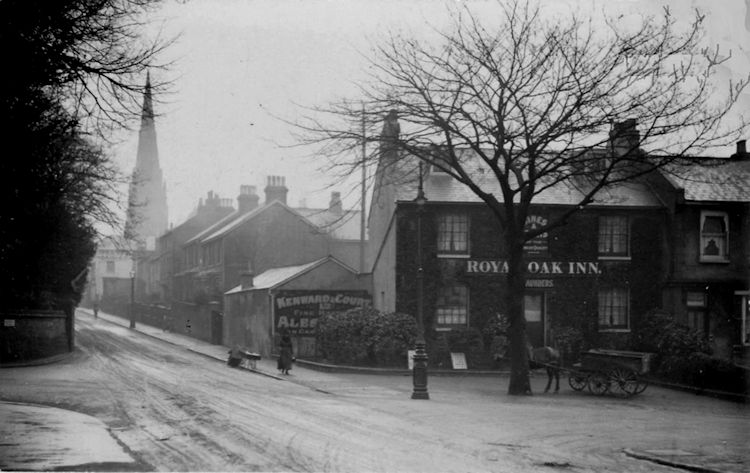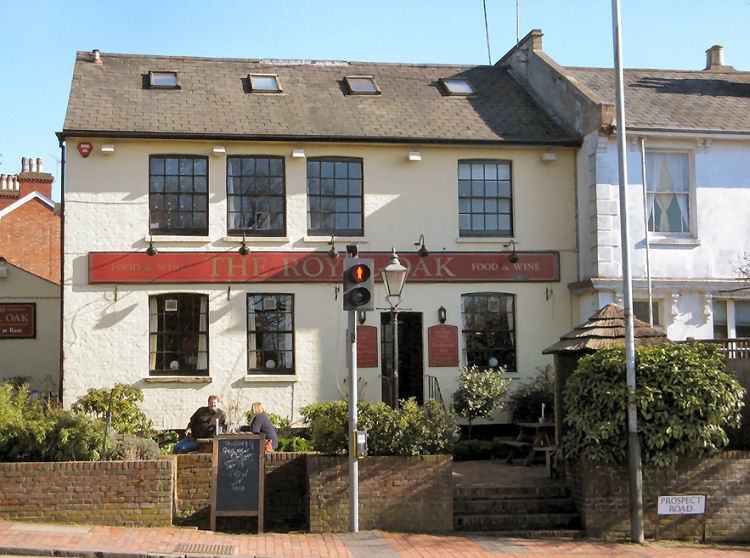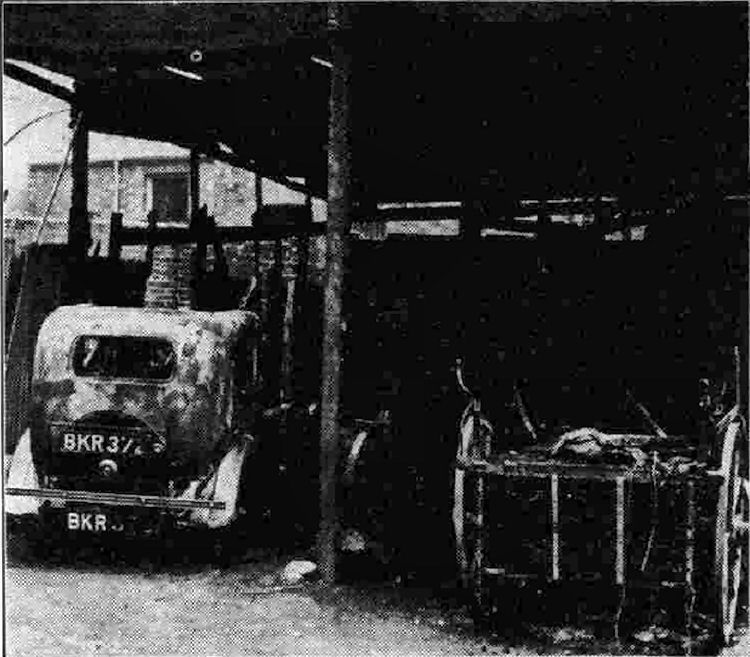|
15 (92) Prospect Road (22 1973
 )
(32 in 1901 )
(32 in 1901 ) )
(Woodsgate
 ) )
Royal Tunbridge Wells
01892 542546
https://whatpub.com/royal-oak

Above photo, circa 1923, kindly sent by Rory Kehoe.
Showing the pub whilst under the tenure of long-serving licensee,
Alexander Saunders and in the livery of E & H Kelsey's Culverden
Brewery, which was located about a mile away. |

Above photo circa 1940s. Kindly sent by Michael Mirams. |

Photo taken 19 March 2011 from
http://www.flickr.com
by Dayoff171. |
|
Kentish Gazette, 1 April, 1806.
On Friday the 10th of March, James Harris, landlord of the "Royal
Oak" at Woodsgate in the parish of Tonbridge, was fined by the Right
Hon. Lord Vis. Boyneone of the Magistrates for the county of Kent,
the sum of three guineas and expenses; as also Win. Martin,
constable of Speldhurst, the sum of ten shillings and all expenses;
the former for refusing to find diet and beer for a party of the
Northumberland regiment quartered upon him; the latter for abusive
behaviour to some soldiers of the said corps in quarters.
|
|
Maidstone Journal and Kentish Advertiser, Saturday 7 July 1866.
Stealing Money.
John Ward, 50, labourer was charged with stealing 5s. 6d., the money
of Edward Johnson, at Tunbridge, on the 26th June.
Edward Johnson said he was the landlord of the "Royal Oak Inn,"
Tunbridge Wells. About 3 o'clock on the afternoon of 26th June, he
heard a noise at the bar. He saw his wife, and from what she said,
he went after the prisoner, and brought him back, and charged him
with stealing the money, when he said "why did you not jump up and
catch me."
Alice Johnson said she was the wife of the last witness. On the
afternoon in question she left her husband in the bar parlour,
asleep, to go to her bedroom to change her dress, while there she
heard a slight noise, and on looking over the banister she saw a man
with ragged trousers and old boots. Witness told her husband and he
went out and brought the prisoner in in about 10 minutes after. She
knew prisoner to be the man whom she saw leaving the home. Before
witness went up stairs she counted the money and found that there
was 19s 6d. in the till; there was half a crown in the till. When
witness counted the money she found that 5s. 6d. was missing, in
which was the half-crown.
Thomas Boooman said that on the 26th June he went about 4 o'clock to
the "Royal Oak;" the prisoner was given in custody upon the charge
of robbing the prosecutor. The sum mentioned was 5s. 6d. When
witness charged prisoner with the offence he made no answer. The
prisoner was taken to the station house and searched, when a
half-crown and other money, amounting to 5s. 11 1/4d, was found upon
him.
The jury found the prisoner not guilty.
|
|
From the Kentish Gazette, 1 August 1837.
George Monckton and William Turner were indicted for assaulting John
Austin on the highway, and stealing from his person a
half-crown.
Mr. Shee stated the case for the prosecution; Mr. Perry defended the
prisoner Turner.
John Austin is a private in the 1st Foot Guards. On the night of the
10th June last, he, in company with his nephew, a lad about
eleven years of age, went into the "Royal Oak," Tonbridge Wells, where
they had a pot of beer. At twelve o’clock they left, on their
road home to his mother’s, who lives in a cottage near Pembury. Observed
the prisoner Monckton as one of the company left at
the public-house. After having left about ten minutes he saw a man lying
in the hedge; spoke to him, but received no answer; left
him and continued his way home. Just after he received a tremendous blow
over his right eye, which felled him to the ground. A
man got on him and demanded his watch. Witness got up on his hands and
knees, and saw two men running away, and he then
found that he had been robbed of half-a-crown; he had no watch; his
nephew ran away the moment he was knocked down. He
got up, and after going over the hedge, for fear the men might come
again, saw the mail-coach go by, and then he got home by
himself. His forehead bled profusely for three hours, and he was laid up
for five days.
Cross-examined by Mr. Perry:- Saw but one man in the hedge.
John Austin, the nephew of the last witness, was then examined, and
corroborated his uncle’s evidence, but added that he saw
two men in the hedge; that he saw both prisoners at the "Royal Oak,"
knew them on the road by their dress, and saw Turner
knock his uncle down, and Monckton jump upon him. The lad was
cross-examined by Mr. Perry, and made the most extraordinary
and prevaricating statements; he and his uncle had been drinking
together at various public-houses on the night in question, and
his answer as to his knowledge of the prisoners was weak in the extreme.
On the other hand various witnesses came forward to
prove that the footmarks of the shoes of both prisoners fitted exactly
with those near the bloody spot, that fresh blood was seen on
the trousers of Turner just after the robbery, and that both prisoners
were with others drinking at the time mentioned at the
"Royal Oak," which is kept by the brother of Monckton.
Mr. Perry, in a very able speech, contended that no evidence had been
given sufficient to prove the identity of the prisoners.
The learned Judge having carefully summed up, the Jury, after a short
deliberation, acquitted the prisoners.
|
|
From the Southeastern Gazette, 10 July 1866.
John Ward, 50, labourer, was charged with stealing 5s. 6d., the money of
Edward Johnson, at Tunbridge, on the 26th June.
Prosecutor keeps the “Royal Oak” public-house, and the money in question
was taken from the till. The evidence, however, was not sufficiently
strong to bring home the case to the prisoner to the satisfaction of the
jury, and a verdict of acquittal was returned.
|
|
From the Kent and Sussex Courier. 12 September 1873. Price 1d.
SHOCKING SUICIDE.
At the "Royal Oak Inn," on Tuesday morning last, at ten o'clock, J. N.
Dudlow, Esq., coroner for Kent, held an inquest on the body of William
Russell, a sawyer, of Windmill Fields, whose death occurred under the
circumstances detailed in evidence. Mr. John Wood was elected foreman of
the jury. The body having been viewed, the Coroner addressed the jury,
informing them that if was their duty to inquire, in the first place, by
what means the deceased came to his death, and in the second place,
whether at the time of the occurrence he was of sound mind. The following evidence was then taken:—
Samuel Russell deposed: I am a bricklayer, living at Tunbridge Wells,
and the deceased was my father. I am not quite certain as to his age,
but I believe that he was 61 last June. He was a sawyer, and lived with
me. On Sunday morning last my little daughter told me that she had found
her grandfather hanging by the bedstead. I went up, and found him
hanging by the neck to the bedstead. That was as near ten o'clock as I
can say. He was quite dead. The last time I saw him alive was about four
o'clock on Saturday afternoon, when I spoke to him. He went to bed about
ten o'clock on Saturday night. At about half-past eight or a quarter to
nine on Sunday morning, I heard him say 'thank you' to a little girl who
had taken some stockings into his room. He has been in a very low state
of mind and in low spirits of late, but during the last fortnight he has
been much quieter. He had been at the Ophthalmic Hospital, and while he
was there a cousin of mine wrote to me asking me to go and visit him, as
he was very strange in his manner. He came home five weeks since last
Friday. He said on one occasion that he was afraid he should come to
some bad end, and I replied, "You must not talk like that, or I must put
you away." He replied, "You must not do that, or I shall go mad
certainly. " He looked strange when he said that. Since that he has been
rather better, and much quieter. He said that he had been a very wicked
man, that there was no forgiveness for him, and that he was in hell and
lost for ever. I believe that the life he had led preyed upon him. Early
on Sunday morning I heard him go down stairs, and afterwards return to
bed, but I did not take any notice of that, as he has done so since his
return from the hospital, his object being to get a little food, as he
said he felt faint. The cord produced produced was the one which was
found round the neck of the deceased. Ellen Russell, aged nine, stated that on Sunday morning, at half-past
eight, her sister Kate took some stockings in to the deceased, and
witness heard him say "thank you." She saw him at that time. A little
after nine she went to call her grandfather to breakfast, when she found
him hanging from the bedpost. She called her father, who cut him down.
On one occasion her grandfather looked as if he was not quite right in
his mind. Owing to the extreme youth of the witness, the coroner did not put her
upon oath. Several of the jury intimated that they had known the deceased, and were
satisfied that he was at times not in his proper senses. Mr. W. C. Satchell, surgeon, deposed that on Sunday morning, shortly
before ten, he saw deceased, who was then quite dead. There were
appearances round the neck—a mark or indentation—from which it appeared
that death had resulted from hanging. The distance from the bed to the
floor was so short that the body could not be suspended. He had no doubt
that the man tied the cord round his neck and then threw himself on to
the floor, and the weight on the rope produced strangulation. He had no
doubt that the man was in an unsound state of mind at the time he
committed the act. The Coroner, in summing up, remarked that the jury could have no doubt
in this case. A verdict "That deceased hung himself while in an unsound
state of mind" was returned. |
|
From the Kent and Sussex Courier, 6 February, 1880.
A MUFFIN SELLER REFUSES TO QUIT THE ROYAL OAK.
George Henry Chestunt, a muffin seller, was summoned for being
disorderly and refusing to quit the “Royal Oak” public house when
requested to do, on the 26th December.
Mr. W. C. Cripps, solicitor, appeared to support the case, and stated
the facts.
Mr. Patrick Tracey, the landlord, said that on the 26th December, at
about two o’clock in the afternoon, the defendant, who was a perfect
stranger, called at his house. In consequence of a complaint made by his
wife to him, he went to the defendant, who was with two others. He told
them they were blackguards to use such language, and requested them to
leave the house. The defendant then asked him to fight, and commenced to
take off his coat. He again asked him to leave, when he said he would
fight any man in the house. He used very obscene language. A customer,
who was in the bar at the time, asked if he thought he could “eat” the
house; thereupon the defendant hit him three times on the mouth or nose
with his fist, and made his nose bleed. The defendant then went out, and
his two companions were ejected. He had great trouble in finding out the
name and address of the defendant, but on Saturday he saw him on the
platform at the railway station.
By defendant: He might have said that he would chuck them out of the
house – William Tudor, of the “Frant Forest,” said he was at the “Royal
Oak” on the day in question. Because the landlady refused to draw him
any more beer, he used very bad language. She refused because he was
quarrelsome and the worse for liquor. His language was not fit for any
woman to hear. When Mr. Tracy came, he ordered the defendant and the
other two out. The defendant refused to go, and was quarrelsome. He was
not particular who he quarrelled with, as he wanted a row. A man who was
standing at the bar, with his hands in his pockets, was struck by the
defendant twice.
The defendant said he was very sorry for what had occurred, but owing to
a few friends coming from London, he had a little too much to drink. He
had served the “lady of the house” with muffins since Christmas.
The Bench said they should always encourage landlords in turning out
disorderly characters. There had been also an unprovoked assault.
Defendants would be fined 10s., and also 10s. costs, or 14 days, hard
labour.
A week was allowed for payment.
|
|
Kent & Sussex Courier, Friday 17 June 1938.
CARS DESTROYED IN GARAGE BLAZE.
Sunday Morning Alarm at Tunbridge Wells, but the Horse was quite
Unperturbed!
"The Royal Oak garages are on fire."

This telephone message flashed to the Tunbridge Wells Police Station in
the early hours of Sunday morning averted what otherwise would have been
a more serious fire.
Racing to the scene in the police utility van, P.S. Squirrell and
several police constables found that the wooden garages at the "Royal
Oak" were blazing fiercely. The Police Constables were P.C.'s Lewis,
Keech and Saunders.
In spite of the intense heat they burst through the flames and dragged
the blazing cars out, but not before these were badly damaged. Within a
few minutes the Borough Fire Brigade arrived, and under the direction of
Chief Officer Goodwin and Second Officer Furneaux soon extinguished the
outbreak.
"It was an exceptionally smart piece of work both on the part of the
Police and the Fire Brigade." and eye-witness told a "Courier" reporter.
"Although the Police arrived within a minute of receiving the alarm, one
of the cars petrol tanks had already burst in the furious heat, throwing
flames high into the air. When the Police arrived they dashed through
these flames, and, heedless of the danger of further explosions from
other cars, they succeeded in dragging the damaged vehicles out one by
one," he added.
SERIOUS DANGER AVERTED.
Another spectator remarked that had it not been for the prompt work of
the Fire Brigade, members of which had dashed from their beds, and were
on the scene within three minutes, the whole of North Street might have
been involved in the blaze.
"Fortunately the wind was in the opposite direction, otherwise it would
be difficult to say how far the outbreak would have spread. Certainly if
the wind had been blowing towards the public house that would have been
destroyed or at least, seriously damaged." he added.
A horse in Garage 7 remained quite unperturbed by the excitement which
had disturbed his Sabbath dawn, and as there was no immediate danger of
this garage being burned the police wisely decided not to risk bringing
the animal out through the flames in the yard.
Altogether, two vans, two cars and two bicycles were destroyed, and one
cart and three other cars were seriously damaged. Afterwards the owner
of the cart made a frantic search of the town in order to purchase
another cart with which to continue his business on the following day.
Residents in the vicinity were roused from sleep, but they did not have
to leave their homes. Windows in St. Peter's Parish Room were cracked,
and other damage was caused by the heat. There were no personal
injuries.
It is thought that the fire was caused by a short circuit in the wiring
of one of the cars, as it was around this particular vehicle that the
flames were fiercest. |
LICENSEE LIST
HARRIS James 1806+
PAWLEY Edward 1828-32+

MONCKTON Mr 1837+
PAWLER Mary Ann 1841+ (age 35 in 1841 ) )
HUNTER William Ralph 1862+
JOHNSON Edward 1866+
DEUDNEY J 1873+

HITCHING Allen 1871-74+ (age 50 in 1871 ) )
TERRY Isaac ????
TRACY Patrick 1880-81+ (age 36 in 1881 ) )
CLARK James 1891+
START Henry 1901-03+ (age 54 in 1901 ) )

TITCHENER George 1913+
SAUNDERS Alexander 1918-30+
WOLVEY Edward 1938+
https://pubwiki.co.uk/RoyalOak.shtml
 From the Pigot's Directory 1828-29 From the Pigot's Directory 1828-29
 From the Pigot's Directory 1832-33-34 From the Pigot's Directory 1832-33-34
 From the Kelly's Directory 1903 From the Kelly's Directory 1903
 Kent
and Sussex Courier Kent
and Sussex Courier
 Census Census
|



